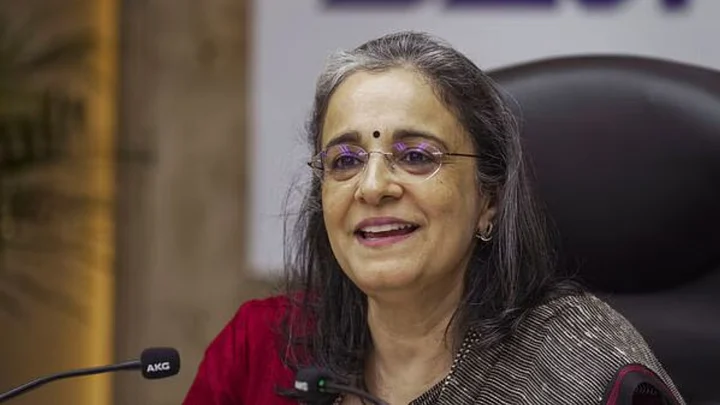Why is Madhabi Puri Buch, chairperson of the Securities and Exchange Board of India (SEBI), still holding her post? This is no longer a question about impropriety or irregularities that she may or may not have been involved in, but more about her style of functioning and the credibility of the office she is holding -- or should one say, holding on to!
Things have reached a point in India where there is no clarity on who should be doing what (or not) while holding a public office like the one she is in command of. Ms Buch may in her own mind have no conflict of interest related to some of the allegations she has been connected with, but in reality, this is more about the office she is occupying than what she thinks she should be doing.
Pawan Khera of the Congress party in the Opposition has alleged that Ms Buch, received Rs 16.8 crore in benefits from her former employer ICICI Group (an allegation that ICICI has denied) and that her post-retiral benefits were higher than her salary while at ICICI.
While the Congress is focusing on the benefits she has drawn from ICICI, the key issues pertain to both the amounts involved and the timing, besides the nature of her office.
Keeping the above in mind, here are five reasons why she should step aside.
1. SEBI is a quasi-judicial institution: The word "regulator" is used for all sorts of bodies from the Reserve Bank of India and the Telecom Regulatory Authority of India to smaller institutions.
But SEBI as the stock market regulator is essentially supervising all of India's capital markets from the point of view of whether companies are performing their functions legally and in the interest of shareholders, particularly the smaller ones. You could say the SEBI chief is akin to the Chief Justice of India as far as the capital markets are concerned. To that extent, the rules and conventions that apply to her should be similar to sitting judges, not private sector executives or indeed, public sector executives.
2. The Disclosure Boss needs to disclose better: Speaking at a conference this week, Ms Puri Buch almost jocularly remarked that even if she utters the word "REIT" (Real Estate Investment Trust) she would be accused of conflict of interest. She said it in all sincerity, but the key point is that SEBI is the Big Boss of India's disclosure business. It is completely unclear as to when and how she disclosed her husband's interest in Blackstone (his employer connected with the REIT business).
In a judicial business, recusals are a matter of public disclosure, not private information. A conflict of interest is not about doing something wrong, but pro-actively communicating a potential conflict of interest. Since the leader of a disclosure-based institution should lead by example, her disclosures on all issues, from her stock options dating back to her ICICI Bank days to her husband's employment, have been severely wanting.
3. Her style is private, while her office is public: From all indications, Ms Puri Buch seems more inclined towards fair play practices that go back to her days in ICICI Bank. Sorry, but a public office is different from a private one. In the private sector, one is accountable to the board of directors as a CEO, and they in turn are accountable to shareholders. The analogy does not hold good for SEBI.
The simple fact is that the SEBI chief has dotted lines to the Finance Ministry, the companies that are listed across Indian bourses and the shareholders they represent...and above all, to citizens of India. The manner of her conduct has been closer to a "closed loop" culture based on internal hierarchy. That falls short of the standards required for a public office.
4. The SEBI chief has been questionably drawing public funds: You cannot hold it against Ms Puri Buch that she has a successful past in the private sector, but it stands to reason that a been-there-done-that person should assume office in a body like SEBI only with a pro-bono-publico principle. She may use incidental facilities or a token honorarium but not much more.
Public disclosures of her salaries and the lucrative ICICI retirement benefits drawn even as she served as the SEBI chief raise questions about her personality. Surely she did not need taxpayers and minority shareholders of Indian companies to foot the bill for her office that should be an honour more than a job.
5. Employees are revolting: SEBI has been at pains to explain away a protest letter by hundreds of the regulator's officers complaining about the work culture in the organisation under Ms Puri Buch's leadership. SEBI officials have filed a complaint to the finance ministry, citing a "toxic work culture" marked by "harsh language and unrealistic targets". She and her supporters may argue that the staff are "misguided."
However, if as many as 500 Grade A officers complain, there is a serious HR problem. If they are right, she is wrong. If they are wrong in such a large number, the entire organisation is going through a trust deficit issue that is bad for the country's stock markets at a time when corporate governance and shareholder issues are key drivers of economic growth.
Take a call, ma'am. This is not just about rules. It is about a high office.
(The writer is a senior journalist and commentator who has worked for Reuters, Economic Times, Business Standard, and Hindustan Times. He can be reached on Twitter @madversity. This is an opinion article and the views expressed are the author’s own. The Quint neither endorses nor is responsible for them.)
(At The Quint, we question everything. Play an active role in shaping our journalism by becoming a member today.)
